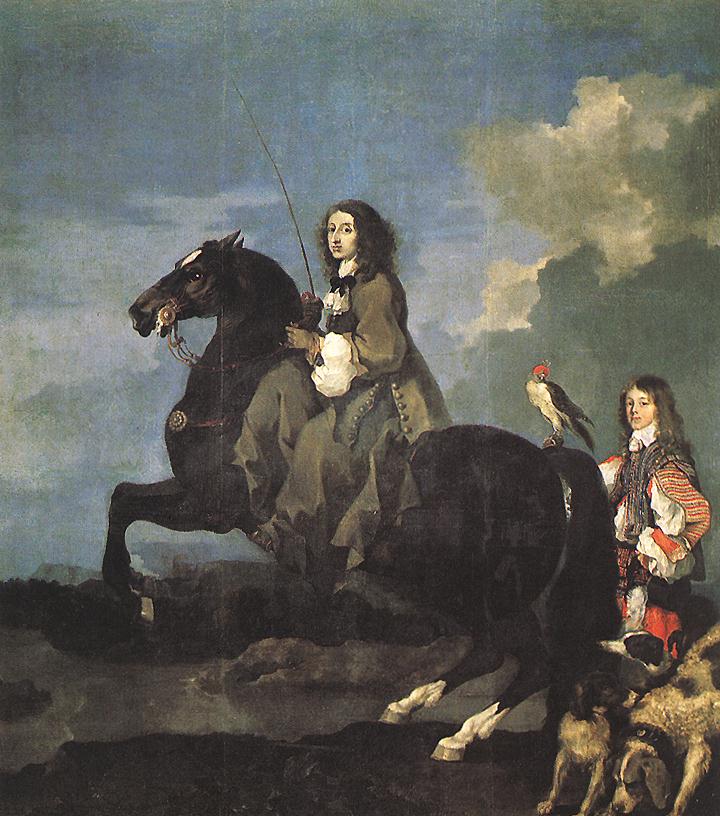There are some characters from History that I can't help but love reading about, and there are few as fascinating as Queen Christina of Sweden.
Who
Christina of Sweden (December 8, 1626-19 April 1689) was the daughter of Gustavus Adolphus of Sweden and, for a time, was Queen of Sweden.
What
Oh boy, you guys. Oh boy. You want a fascinating character from history? Christina is it.
Christina was the first and only child of her parents. She was born in caul and initially thought to be a boy. Even after she was identified as a girl, her father ordered that she be raised as a boy and she was educated as such. She had an interest in a variety of subjects, and enjoyed activities like riding horses which necessitated wearing more masculine styles of clothing (a style that she favored for most of her life).
When she was six years old, her father died and she became queen though a regency began. During her youth, Christina was the subject of gossip across Sweden for a lot of reasons: her masculine manner, her not-so-very-clandestine affair with a lady of her court, her habit of butting heads with the government, an attempted assassination, and others.
Christina became queen at the age of 18, but it was another several years until she was crowned. In 1649 Christina had named her cousin as her heir. This set the stage for her abdication as well as being a way to stop the pressure to marry him. She was officially crowned as queen on October 20, 1650, but after difficult years of ruling she abdicated the Swedish throne on June 5, 1654.
After her abdication, he disguised herself as a man, left the country to go to Rome, and she converted to Catholicism on Christmas Eve of 1654. She was warmly received by Pope Alexander VII. In Rome, she was hostess to some of the most brilliant minds in the world of her time.
During her residence in Rome, she notably traveled to France where she shocked the court with behaviors like not sitting properly and clapping at the ballet. The elites were apparently impressed, but more with her as an oddity than as a person. In 1656 a plan was conceived to put Queen Christina on the throne of the Kingdom of Naples, but this fell apart before it could really take hold because of her master of the horse making the plot known. Christina returned to Rome.
Despite a desire to return to Sweden, she remained in Rome until her death on April 19, 1689. She was buried in the crypt beneath St Peter‘s Basilica and has a prominent monument on display there in her honor; Queen Christina is one of only three women to be so honored.
Much has been made of Christina's gender and sexuality. Was she asexual? A lesbian? Bisexual? Was she a masculine woman or was she not cisgender? We know that she had an affair with a women very publicly and we know that she had an intense and probably romantic relationship with a Cardinal while living in Rome. We know that she dressed in men's clothing, but she did insist that she was a woman. For my part, I really don't think that the label matters unless you're trying to argue it in the historical studies. She had affairs with men and women. She was certainly variant in her gender expression, eschewing all of the things expected of women. But Christina was Christina, and I am uncomfortable labeling her as anything other than that without her say-so.
Why
Other than being an absolutely fascinating character from history, Christina is inspiring because she thoroughly broke the gender norms and was fabulous while doing it. Was she a perfect person? Heavens, no! But she was fascinating, and that makes her worth a look.
She's also a really fun example of defying gender norms, and that is important to me. I might express my gender as very feminine, but I love stories about those who defy the norms in any direction.


Oh wow, this might be my new favorite person in history. Have any historical novels ever been written about her? I definitely need to do some digging here....
ReplyDeleteI'm sure there are, but my main exposure to her has been through more factual historical texts and through film (specifically Greta Garbo's performance in 'Queen Christina'), so I can't recommend any. If you find a good one, though, let me know!
Delete